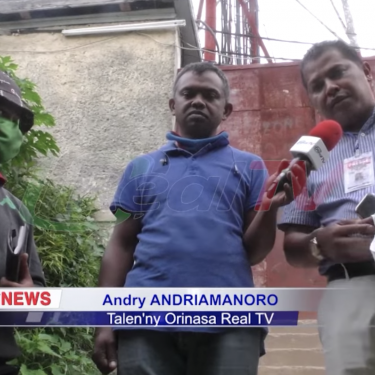Madagascar : Sabotage silences TV channel that criticized coronavirus measures

Reporters Without Borders (RSF) calls on Madagascar’s authorities to shed all possible light on an act of sabotage that has silenced an opposition TV channel and to guarantee journalistic freedom, which is more essential than ever during the global health crisis resulting from the Covid-19 pandemic.
Real TV has been off the air for the past week, ever since it was about to rebroadcast an interview with former President Marc Ravalomanana – a long-standing rival of the current president, Andry Rajoelina – in which Ravalomanana criticized the government’s handling of the coronavirus crisis. Just as the TV channel was about to retransmit the interview, unidentified persons damaged its transmitter and antenna on the night of 6 April despite the presence of soldiers who are “supposed to guarantee the security of this strategic location,” Real TV’s director said in a statement.
This sabotage is all the more disturbing for having come shortly after Real TV and two other opposition media outlets, Radio AZ and Radio Soleil, received a formal warning from the ministry of communication and culture about their coronavirus coverage, including their failure to provide live retransmission of the state media’s news bulletins about the epidemic.The warning also referred to the interview originally broadcast on 25 March in which Ravalomanana said the government closed Madagascar’s borders too late and could not handle the crisis on its own. The ministry said the interview constituted incitement to hatred of the authorities and civil disobedience.
“The fight against the coronavirus must not be used as a pretext for increased control of the news media and sanctions against media outlets that dare to carry criticism of the way the health crisis is being handled,” said Arnaud Froger, the head of RSF’s Africa desk. “The sabotaging of a TV channel’s transmission installations that soldiers were supposed to be guarding must be the subject of an impartial investigation that identifies those responsible. It is unacceptable that, in addition to being harassed, a media outlet can be physically attacked with complete impunity.”
The coronavirus epidemic is such a fraught issue that particularly rancorous social media attacks on the government can result in imprisonment. The judicial authorities are refusing to release Arphine Rahelisoa, the editor of the Valisoa newspaper, who has been held since 4 April after she referred to the president as a murderer on Facebook because of his handling of the crisis.
Although Madagascar’s authorities have so far reported only 108 Covid-19 cases and no deaths, the requirements imposed on the media are among the radical in Africa, with radio and TV stations subject to penalties if they fail to broadcast official bulletins about the coronavirus epidemic, and banned from broadcasting phone-in programmes. But there are no other restrictions on the information they broadcast, the communication ministry says.
Madagascar is ranked 54th out of 180 countries in RSF’s 2019 World Press Freedom Index.



